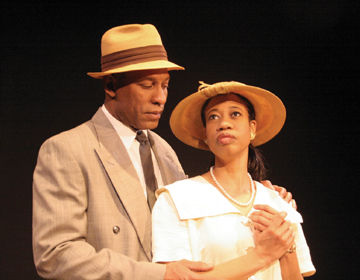 Regina Washington and William Earl Ray star in Jubilee’s latest, melancholy production.
Regina Washington and William Earl Ray star in Jubilee’s latest, melancholy production.
|
| Blues for an Alabama Sky\r\nThru Feb 26 at Jubilee Theatre, 506 Main St, FW. 817-338-4204. |
|
A D V E R T I S E M E N T
|
|
|
|
A D V E R T I S E M E N T
|
|
Mood Indigo
Jubilee Theatre returns after the death of its founder with a powerful Blues for an Alabama Sky.
By JIMMY FOWLER
More than eight months have passed since the death of Jubilee Theatre founder and writer-director Rudy Eastman, but judging by its nimble, tough-minded new production of Blues for an Alabama Sky, the company is not languishing in morbid nostalgia under new managing director Eric Salisbury. Indeed, virtually every facet of this staging — from the set to lighting to pacing to the uniformly rich, complex performances — suggests that Eastman’s demise has endowed these artists with a determination to keep throwing off sparks within the long shadow that he casts.
Eastman had a connoisseur’s nose for scripts that combined a sense of history with characters’ personal tribulations, and Blues, a 10-year-old drama by novelist-playwright Pearl Cleage, is a piece that, unsurprisingly, had been selected by Eastman before he died. Cleage is predominantly known for fiction about the professional and personal intrigues of contemporary black professionals in her hometown of Atlanta, but she also writes and performs experimental political pieces for the stage with her husband under the banner Live At Club Zebra. The remarkable Blues for an Alabama Sky manages to be vibrantly politically minded without deteriorating into agitprop or even being overtly partisan on subjects like contraception, abortion, and homosexuality. Cleage seems to understand that she needs to clothe her characters in sympathetic flesh and sturdy if fallible backbone to give their causes real urgency — there must be a rounded personality present beyond whether you agree or disagree with what they’re saying.
Cleage has chosen to focus on an archetypal moment of 20th-century transition during which five African-Americans struggle to get their bearings as the ground shifts. It’s a New York City summer in 1930, and the glories of the Harlem Renaissance are just beginning to slide into the Great Depression. Langston Hughes is still throwing parties for the literati and their courtesans, champagne bottles are plentiful springs that flow underneath the Prohibition laws, and Cab Calloway is nightclub royalty headlining just around the corner. But the unemployment lines are growing, and eviction notices are getting pasted up all around Angel (Evette Perry-Buchanan) and Guy (Chanina Mwikuta), roommates and fellow refugees from Georgia who’ve gone north seeking cultural sophistication and moral freedom. He’s a “notorious homosexual” and costume designer who stalks the great Parisian entertainer Josephine Baker with telegrams containing designs of his original creations; she’s a corn-swilling cabaret singer with a penchant for favors from Italian gangsters. The couple lives across the hall from the idealistic and decidedly unflashy social worker Delia (a crisp Regina Washington, utterly without sainthood), who’s working with feminist and contraceptive pioneer Margaret Sanger to open Harlem’s first family-planning clinic. Delia also has her eye on a handsome obstetrician named Sam (William Earl Ray), a man as famous for delivering Harlem’s burgeoning infant population as he is for “taking care” of the unwanted pregnancies of the neighborhood’s single women.
This quartet thrives on the creativity and permissive climate of the cultural moment, until an Alabama carpenter and widower named Leland (Vincent McGill, who nicely hints from the start at the character’s impending eruption) moseys into their world and begins courting Angel, who’s less interested in a soulmate than a reliable rent provider. As their individual dreams begin to converge and conflict, audiences will have difficulty predicting the intriguing curves of fate that playwright Cleage tosses at them right up until the end.
Under the assured and nuanced direction of Sharon Benge, all the potentially messy thematic components of Blues coalesce into a haunting illustration of the ways people cling to their illusions even harder as evidence to the contrary mounts. Leland, the quiet, conservative country boy, refuses to relinquish Angel because she vaguely remembers his wife who died in childbirth. Angel is running from one man to another — both straight and gay — in pursuit of a luxury that will come without cost. Delia tries to ignore Sam’s warnings about the impending charges of racial genocide from neighborhood men who see her working with Sanger, a white activist, to insure that “women don’t have to get pregnant every time they make love.” And Guy, the gay romantic with an acerbic tongue, pines for Josephine Baker’s libertine Paris with the fervor of Chekhov’s three sisters for Moscow.
Brynn Bristol’s set design superbly enhances the quasi-apocalyptic flavor of the material, in which young men with straight razors begin to menace the Harlem streets as the Depression advances: A brownstone façade blasted open with jagged edges reveals the furious machinations of the people inside, all of whom are hatching plots to escape someone or something. Benge deftly maneuvers each actor through a constant shift of sympathies from audience members, who may have difficulty wholeheartedly embracing anybody even as they’re all so heartbreakingly watchable. Chanina Mwikuta wisely avoids overdosing on snap-queen mannerisms, a restraint that lends Guy’s dreams real gravity. The stunning Evette Perry-Buchanan makes Angel a seductive opportunist you want to root for, even as you’re aware she won’t be happy for long with anything she gets. She’s the tattered heart of Blues for an Alabama Sky, which is all about the perpetual ache for the distant star that won’t stop distracting you.
 Email this Article...
Email this Article...

